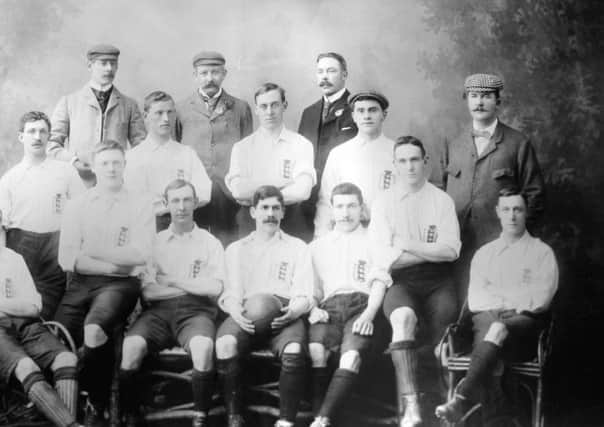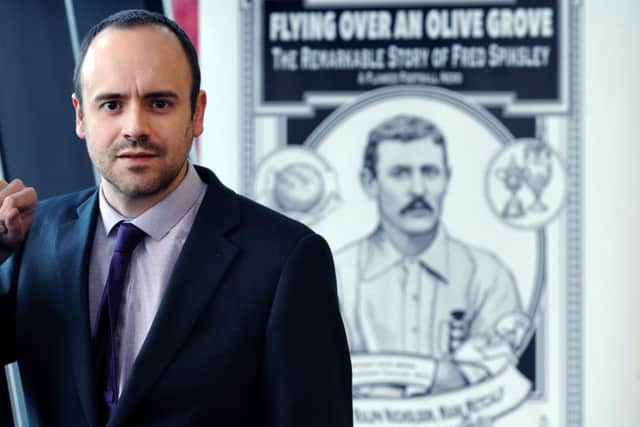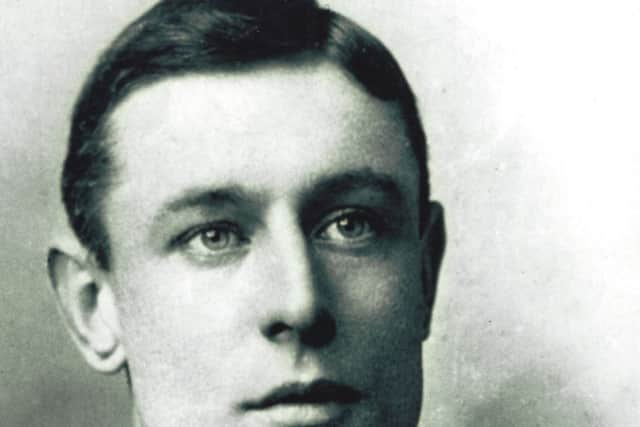Fred Spiksley - The Sheffield Wednesday star who shared a stage with Charlie Chaplin


These days it’s a little known corner of Sheffield, a mile or so south east of the city centre. But for just over a decade at the end of the 19th Century, Olive Grove was home to Sheffield Wednesday Football Club.
Today the only real clue to its footballing heritage is a plaque on the council depot wall commemorating Wednesday’s triumph in the 1896 FA Cup Final. Special mention is given to one of its star players Fred Spiksley, known affectionately by fans as the ‘Olive Grove Flyer’, who scored both goals in the match - the first time a Yorkshire team won the trophy.
Advertisement
Hide AdAdvertisement
Hide AdSpiksley played for the Sheffield club for 11 years during which time he scored 170 goals. It was one of many achievements during a career that saw him become the first player to score a hat-trick against Scotland and lay claim to the fastest goal (though the history books don’t confirm this) in an FA Cup final - just 20 seconds.


Spiksley was a diminutive left winger, or outside left in old money, but what he lacked in physical stature he more than made up for with technique and blistering pace.
He was the Raheem Sterling of his day a player of whom Herbert Chapman, widely regarded as the man who pioneered the modern game, once said: “Fred Spiksley, in my judgment, was unsurpassed both in poise and balance, and in his ability to work the ball.”
Yet despite such superlatives his name has all but slipped from popular memory, known only to a handful of football historians and those fans with a deep-seated knowledge of the history of the game.
Advertisement
Hide AdAdvertisement
Hide AdBut a new book about the man may just change all that. Flying Over An Olive Grove: The Remarkable Story of Fred Spiksley - A Flawed Football Hero, charts the story of his life from his humbling working class beginnings in Lincolnshire through to his fame as one of England’s best known footballers and a life with more twists and turns than a Lionel Messi dribble.


It is co-authored by Clive Nicholson, his father Ralph and football writer Mark Metcalf. Spiksley is Clive’s great, great uncle and the book has been more than 20 years in the making.
“I was 10 years old when I first heard about him,” says Clive, who works as a teacher in York. “There were some medals in the loft of my grandma’s house but apart from that no one knew very much.”
What started as a classroom exercise grew into something far bigger. “It was a school project that got out of control. I kept on finding new things about him that led me down another path.”
Advertisement
Hide AdAdvertisement
Hide AdHe and his father have spent the past two decades trawling through newspaper archives to gradually piece together a detailed portrait of Spiksley’s life. They discovered that Fred had written a series of autobiographical pieces about his days as a footballer, including one for Thomson’s Weekly, which feed into their book.


Spiksley lifted the lid on what life was like as a Victorian footballer which sets him apart from his peers. “Some players might have achieved more or won more medals but Fred was one of the only players from that era who wrote about his experiences,” says Clive.
Fred Spiksley was born in Gainsborough in 1870 and grew up in the Lincolnshire town. He played for his local team but made his name with Sheffield Wednesday, although at one point it looked like he wouldn’t last long, and not just as a player.
“He lived in Sheffield for a year and a half but in those days there was a lot of smoke from all the industry and he struggled with his breathing. Doctors told the club that Fred would die within a year from TB, though they kept it from him. He was allowed to move back to Gainsborough where the air was cleaner and a year later he was fine.”
Advertisement
Hide AdAdvertisement
Hide AdThose who played alongside him frequently talked about his speed and skill. “He was the best left winger in the country and he could have walked into any team,” adds Clive.


He also had the knack of turning it on in the big matches, as he did when he scored a hat-trick against Scotland at Richmond in 1893. His match-winning performance caused a bit of a stir both on and off the pitch.
Among those watching that day was Princess Mary of Teck, later Queen Mary, who chased after the goal-scoring hero. “It was the first time a member of the Royal Family had been to a football match. Mary was quite young and she got carried away and started running down the touchline waving her handkerchief,” says Clive.
Spiksley played the game at a time when some of the tackling was agricultural to say the least and injuries eventually took their toll. “He wasn’t built for football in those days he was much more suited to the modern game.”
Advertisement
Hide AdAdvertisement
Hide AdHe retired from playing professionally in 1906 and this could easily have been the end of the story, but in many ways it was just the beginning. He now needed to find a new job (it would be another 85 years before the Premier League gravy train came along), so when he spotted an advert asking for footballers to perform in a stage show called The Football Match, he jumped at the chance.
The show was the brainchild of theatre impresario and pantomime king Fred Karno and it went on several big tours around the country, the last of which featured a certain Charlie Chaplin who in just a few years would become the most famous person on the planet. “Fred was one of three footballers in the show and we know that he performed at least 30 times on stage with Charlie Chaplin,” says Clive.
After his brush with acting he returned to football, carving out a long and successful career as a coach. This brought with it further excitement. In 1914 he was working in Nuremberg when war broke out. “Initially there wasn’t an issue but as tensions increased Britons started to be rounded up.” He was among those sent to an internment camp but managed to escape and make his way back to England.
Spiksley went on to become the first professional footballer to coach on three continents - including working in Mexico, Peru and a stint coaching Sweden’s national side. Then in 1929 he became the first person to put together a football coaching skills film.
Advertisement
Hide AdAdvertisement
Hide AdOff the field Spiksley developed a reputation as a gambling addict and a womaniser, though the latter waned after he married (for a second time) a German woman called Rose, some 20 years his junior.
The pair remained together until Spiksley died at the age of 78. He died as he’d lived his life, on the move - collapsing as he ran to collect his winnings during a day at the races.
For Clive, working on the book has been about more than just paying homage to a relative. “It’s not just about honouring Fred it’s about all those players from that period. Football historians tend to focus on the start of the amateur game, players at the start of the 20th century and those who fought in the First World War.”
But he says history hasn’t been kind to the memory of those who played during the 1880s and 90s. “Some people might have heard of ‘Fatty’ Foulke and Steve Bloomer but that’s probably about it. But this was when the professional games really started and it’s become a forgotten story. So we hope this book is a tribute to all of those players who never really got the recognition they deserve.”
Advertisement
Hide AdAdvertisement
Hide AdFlying Over An Olive Grove: The Remarkable Story of Fred Spiksley - A Flawed Football Hero, published by Red Axe Books, is out now priced £19.99. The book is available at Waterstone’s and www.spiksley.com
Fred Spiksley: the Olive Grove Flyer
His list of footballing achievements is impressive:
He was the first player to score a hat-trick against Scotland and the first Sheffield Wednesday player to score at Hillsborough - he also scored the first hat-trick at the ground.
Spiksley has the highest average goal ratio of any winger in the history of English football.
He scored a hat-trick on his England debut against Wales in 1893.
Advertisement
Hide AdAdvertisement
Hide AdIt is believed, though unconfirmed, that he scored the fastest ever FA Cup final goal - 20 seconds.
He was reportedly the first ever footballer to receive a three year contract.
Spiksley was the first professional footballer in Leeds, playing for what was then Leeds City.